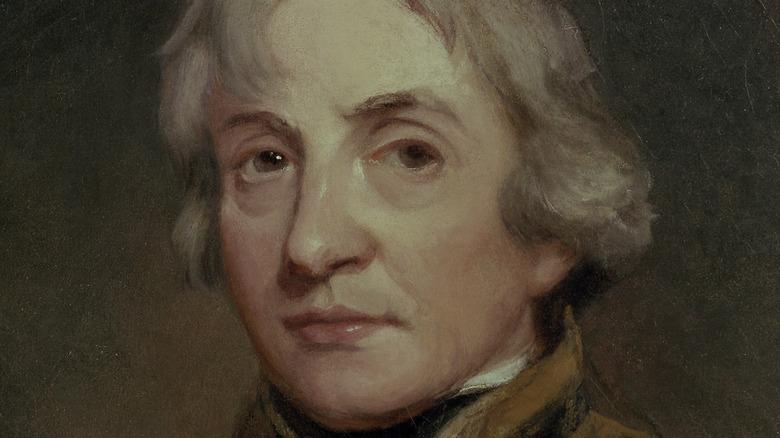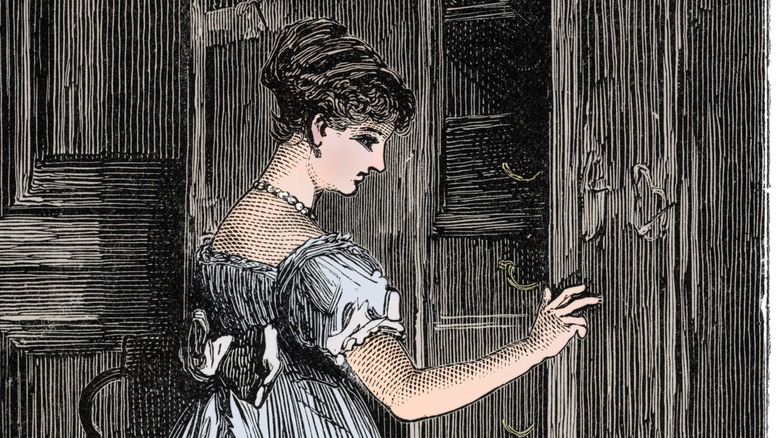The True Origins Of The Phrase Turn A Blind Eye
The phrase "turn a blind eye" is often given an adventurous origin story. The tale includes a historic navy battle, a rogue admiral disobeying orders, and a battle scar (per The Phrase Finder). While a naval battle makes for excellent lore, the phrase has deeper roots.
Meaning to ignore something important, the phrase "turn a blind eye" is incorrectly cited as originating during the 1801 Battle of Copenhagen – a significant British victory during the Napoleonic Wars. That day, Admiral Hyde Parker was in charge (via The Phrase Finder and Britannica). While the most senior officer, Parker was more cautious than his second-in-command, Admiral Horatio Nelson (above). Nelson was blind in one eye at the time of the battle due to an injury incurred in Corsica (per Britannica).
The story goes that Parker sent out a signal for a retreat due to the number of losses suffered by the British fleet. In disagreement with Parker, Nelson insisted that pushing forward would ensure a win. Rather than acknowledging Parker's retreat signal, Nelson held his spyglass to his blind eye, stating, "I have only one eye — and I have a right to be blind sometimes ... I really do not see the signal" (via The Phrase Finder). Nelson's hunch was correct, and historians call the battle one of his great victories. However, Nelson didn't say the phrase "turn a blind eye." Instead, he literally turned his blind eye to Parkers' signal to retreat (per Britannica).
The 'horrid novel' and the glass eye
The first written account of "turning a blind eye" could not be further from a battlefield. The phrase first appears in a gothic novel whose author was not known for his skill. In fact, one of his books made it onto Jane Austen's list of "horrid novels" in "Northanger Abbey" (via Persuasions, accessed on Gale Academic Onefile).
The British author Francis Lathom's novel "Men and Manners" is credited as the phrase's source. The book, published in 1800, beats the Battle of Copenhagen by one year (per Phrase Finder). Critics described Lathom's books as "'made-to-order' Gothic fictions," accusing him of cashing in on the gothic trend. One writer called his novels "cynical exercises in an assumed manner" (per The Corvey Novels Project at the University of Nebraska).
In the novel, the phrase appears during an exchange between two gossips, Sir Harry and Lady Varny, discussing the recent marriage of Lady Gab and General Howitzer. Lady Gab grows smitten with the General after his glass eye accidentally falls out. As Sir Harry says, Lady Gab becomes "so charmed by its structure, that she immediately resolved on giving him her hand." Lady Varny replies, "It is lucky for the poor man he has a blind eye to turn to her." And with that jabbing pun at Lady Gab, Lady Varny is the first to use the phrase. Whether "horrid" writing or a tired attempt at pop fiction, Lathom's words leapt beyond the page and into our daily language.
Deaf ear and blind eye
In fact, "turn a blind eye" has deeper roots as a part of the older expression, "to turn the deaf ear and blind eye." The first written account of the phrase appears in the 1698 text "A Discourse of Walking by Faith" by the English philosopher and clergymen John Norris (per Word Histories). Norris is known for quarreling with John Locke and pushing a dour view of the world in which all earthly joys are shunned in the pursuit of God (via Encyclopedia).
Norris proposes, "To have the World Crucify'd to us; to be dead to its Pleasures, and insensible of its Charms, to turn the deaf Ear, and the blind Eye to all those Pomps and Vanities of the World" (via Word Histories). Essentially, he urges his readers to ignore the trivial yet enjoyable parts of life to pursue a pure relationship with God.
Though it has austere roots, "deaf ear and blind eye" lives on today. In 2016, the Chicago Tribune reported on an annual Rev. Martin Luther King Jr. celebration at St. Paul AME Church in Glencoe, Illinois. The article relays Rev. Norris Jackson Jr.'s remarks. He said that "people could not turn a 'deaf ear or blind eye' to police brutality or unfair housing." Perhaps the persistence of the phrase reflects our need to use it. With every new century and generation, English speakers still express frustration when people knowingly ignore something of great significance.


